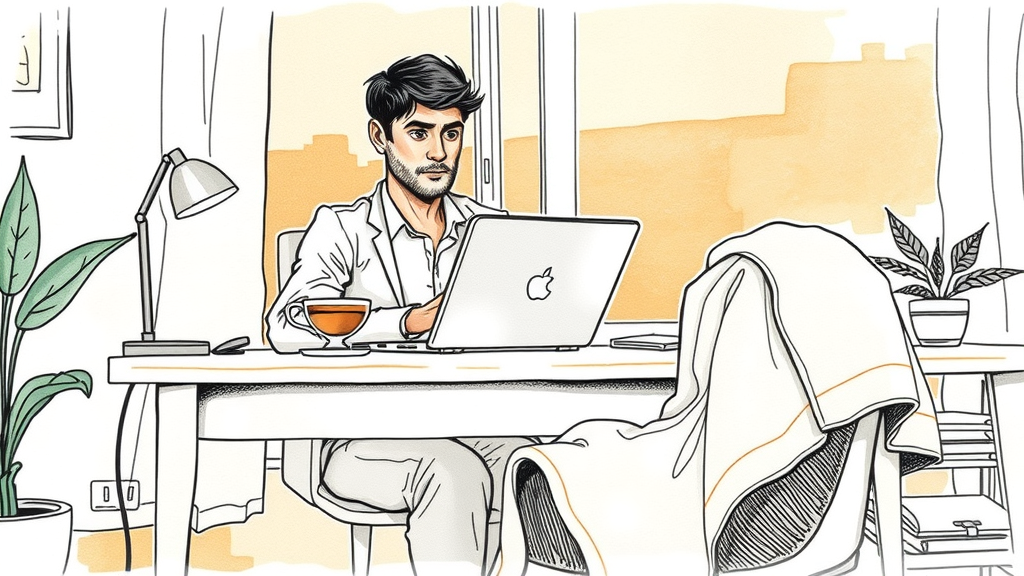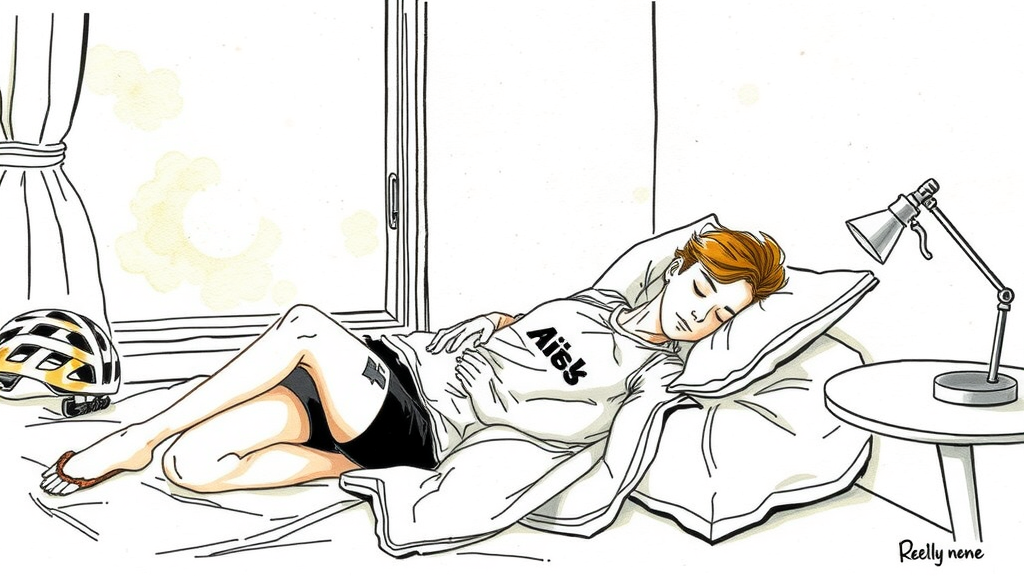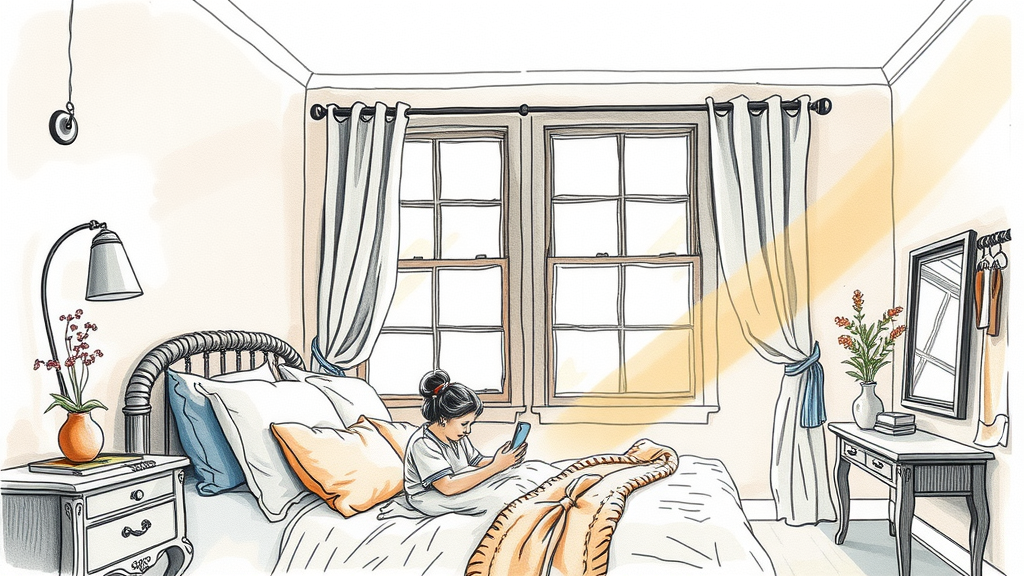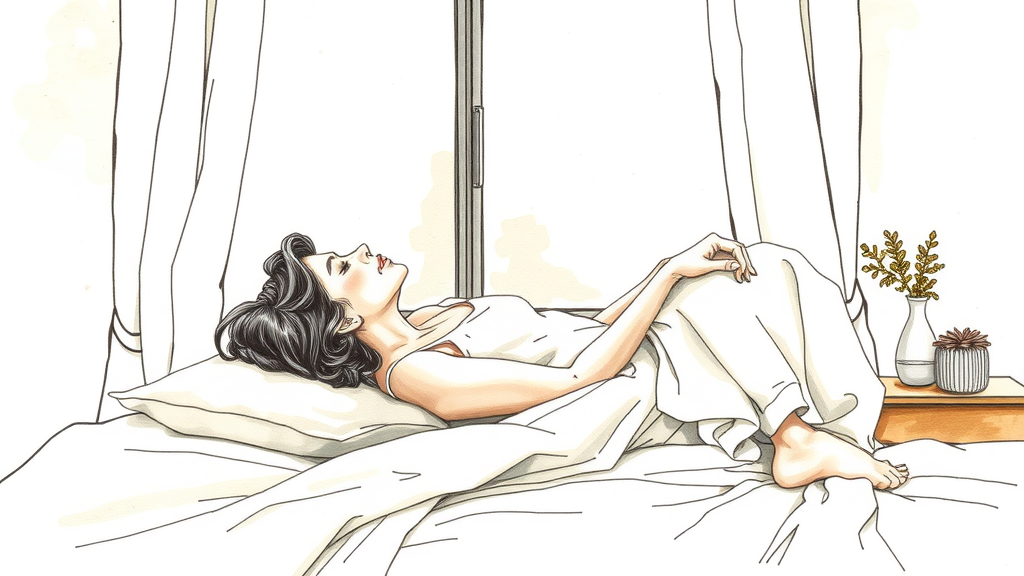· undefined · Health · 15 min read
The Ultimate Guide to CBTI Sleep Therapy for Managing Anxiety-Induced Insomnia
Discover how Cognitive Behavioral Therapy for Insomnia (CBTI) offers effective, drug-free sleep therapy to achieve lasting insomnia relief.
Understanding the Vicious Cycle: Anxiety, Insomnia, and You
In our fast-paced world, anxiety has become a pervasive challenge, often manifesting in unexpected ways – one of the most frustrating being its disruptive impact on sleep. For millions, the quiet hours meant for rest transform into a battleground of racing thoughts, worry, and restless nights. This isn’t just an occasional bad night; it’s a chronic struggle with anxiety-induced insomnia, leaving individuals exhausted, irritable, and less able to cope with daily stressors. The connection is undeniable: anxiety creates a hyper-aroused state that makes falling asleep difficult, and the resulting sleep deprivation then exacerbates anxiety, creating a relentless, draining cycle.
But what if there was a powerful, drug free sleep treatment that could break this cycle? What if you could learn to retrain your brain and body to embrace restful sleep, even in the presence of anxiety? Enter Cognitive Behavioral Therapy for Insomnia (CBTI), a scientifically validated sleep therapy that offers a sustainable path to insomnia relief. Unlike quick fixes or medications that mask symptoms, CBTI empowers you with strategies to address the root causes of your sleep problems, offering a long-term solution to reclaim your nights and, by extension, your days.
What is Cognitive Behavioral Therapy for Insomnia (CBTI)?
At its core, Cognitive Behavioral Therapy for Insomnia (CBTI) is not just a collection of tips for better sleep; it’s a structured, evidence-based program designed to change the thoughts and behaviors that contribute to insomnia. Recognized as the gold standard drug free sleep treatment, CBTI targets the learned associations and cognitive processes that interfere with natural sleep. It’s a comprehensive approach that acknowledges the intricate relationship between our minds, our bodies, and our sleep patterns.
CBTI operates on two main pillars: the “cognitive” and the “behavioral.” The cognitive aspect focuses on identifying and challenging unhelpful thoughts and beliefs about sleep that fuel anxiety and prevent rest. The behavioral component, on the other hand, involves implementing practical strategies to establish healthy sleep habits and re-regulate your body’s natural sleep-wake cycle.
Unlike traditional sleep therapy approaches that might only skim the surface with general sleep hygiene advice, CBTI delves deeper, providing personalized tools to dismantle the very mechanisms that keep you awake, especially when anxiety is a major player.
The Science Behind CBTI: How It Works for Anxiety-Induced Insomnia
The effectiveness of CBTI for insomnia relief, particularly when anxiety is involved, lies in its multi-faceted approach to disrupting the dysfunctional patterns that perpetuate sleeplessness. It doesn’t just treat the symptom; it targets the underlying cognitive and behavioral processes.
Addressing Cognitive Arousal
Anxiety thrives on worry, and for someone with anxiety-induced insomnia, this worry often becomes fixated on sleep itself. Thoughts like “I’ll never sleep tonight,” “I can’t function without enough sleep,” or “What if I’m awake all night again?” create a state of mental hyper-arousal. This cognitive overactivity triggers a physiological stress response, flooding the body with cortisol and adrenaline, making relaxation and sleep nearly impossible. CBTI uses cognitive restructuring techniques to help individuals identify, challenge, and ultimately replace these maladaptive thoughts with more realistic and helpful ones, reducing the mental chatter that keeps them awake.
Breaking Maladaptive Behaviors
Over time, people with insomnia often develop behaviors in an attempt to cope with sleeplessness, but these behaviors inadvertently make the problem worse. This might include spending excessive time in bed awake, napping excessively during the day, inconsistently timed bedtimes and wake times, or using the bed for activities other than sleep (like working, watching TV, or worrying). These behaviors weaken the association between the bed and sleep, confusing the body’s natural sleep cues. CBTI implements specific behavioral strategies to re-establish a strong, positive connection between the bed and prompt, restful sleep.
Physiological De-arousal
The constant state of alertness brought on by anxiety keeps the body in a “fight or flight” mode, which is antithetical to sleep. CBTI incorporates relaxation techniques aimed at calming the nervous system. By teaching individuals how to consciously reduce physical tension and mental agitation, CBTI helps to lower the body’s overall arousal levels, making it easier to transition from wakefulness to sleep. This comprehensive attack on cognitive, behavioral, and physiological factors makes CBTI an incredibly potent and drug free sleep treatment.
Core Components of a CBTI Program
A typical CBTI program is highly structured, delivered over several sessions, and customized to the individual’s specific needs. While the exact blend of techniques may vary, most programs include the following core components:
Sleep Restriction Therapy (SRT)
This is often considered the most powerful component of CBTI. Paradoxically, SRT involves temporarily reducing the amount of time you spend in bed to match your actual sleep time. The goal is to create a mild state of sleep deprivation, which intensifies your sleep drive and makes falling asleep easier and more consistent. As sleep efficiency improves, your time in bed is gradually increased. This technique is particularly effective in breaking the cycle of fragmented sleep and excessive time spent awake in bed. For individuals looking into specific sleep interventions tailored for the elderly, exploring guides like managing sleep challenges in seniors with CBTI can offer valuable insights into how these techniques are adapted.
Stimulus Control Therapy (SCT)
SCT aims to re-associate your bed and bedroom with sleep and relaxation, breaking any learned associations with wakefulness, frustration, or anxiety. Key rules include:
- Go to bed only when sleepy.
- Use the bed only for sleep and sex.
- If you’re awake for more than 15-20 minutes, get out of bed and go to another room. Return only when you feel sleepy again.
- Establish a consistent wake-up time every day, regardless of how much you slept the night before.
- Avoid napping during the day, or limit naps to a very short duration and early in the afternoon.
These guidelines help to strengthen the bed-sleep connection, making it an automatic cue for rest.
Cognitive Restructuring
This component directly addresses the cognitive aspect of cognitive behavioral therapy for insomnia. It involves identifying and challenging distorted or unhelpful thoughts and beliefs about sleep that contribute to anxiety. For example, if you believe “I must get 8 hours of sleep or I’ll be sick,” cognitive restructuring helps you examine the evidence for and against this belief and replace it with a more balanced perspective, such as “While 8 hours is ideal, even less sleep allows me to function.” This process reduces performance anxiety around sleep and allows for a more relaxed approach.
Relaxation Techniques
To counter the physical and mental hyper-arousal of anxiety, CBTI incorporates various relaxation strategies. These might include:
- Progressive Muscle Relaxation (PMR): Tensing and then relaxing different muscle groups to become more aware of and release physical tension.
- Diaphragmatic (Belly) Breathing: Slow, deep breathing that activates the parasympathetic nervous system, promoting relaxation.
- Mindfulness Meditation: Focusing on the present moment without judgment to calm a racing mind.
- Guided Imagery: Using mental images to promote a state of relaxation.
These techniques provide immediate tools to calm your body and mind before bed or during awakenings. Many highly driven individuals, such as those who are always on the go, often find these practices invaluable. For instance, specific CBTI techniques for teachers can be particularly beneficial for managing stress and improving sleep quality after demanding workdays.
Sleep Hygiene Education (Supportive Role)
While often confused with CBTI, sleep hygiene is typically a supportive component within a broader sleep therapy program. It covers general practices that promote good sleep, such as:
- Maintaining a consistent sleep schedule (even on weekends).
- Creating a comfortable, dark, quiet, and cool sleep environment.
- Avoiding caffeine, alcohol, and heavy meals close to bedtime.
- Limiting screen time before bed.
- Engaging in regular physical activity, but not too close to bedtime.
These practices create an optimal environment for sleep, complementing the core CBTI strategies.
The Journey Through CBTI: What to Expect
Embarking on CBTI for insomnia relief is a collaborative process that typically spans 6 to 8 weekly or bi-weekly sessions with a trained therapist. Each session builds upon the last, guiding you through the principles and practices of the therapy.
Initially, your therapist will conduct a thorough assessment of your sleep patterns, medical history, and specific challenges related to anxiety. You’ll likely be asked to keep a detailed sleep diary for a period, which provides valuable data for your therapist to tailor the program to your unique needs. This diary is crucial for tracking progress and identifying patterns.
Over the course of the sessions, you’ll learn about the mechanisms of sleep, how insomnia develops, and how your personal thoughts and behaviors contribute to your sleep problems. Then, you’ll be systematically introduced to the core CBTI components – sleep restriction, stimulus control, cognitive restructuring, and relaxation techniques. It’s not passive learning; you’ll be given specific tasks and exercises to practice between sessions, gradually implementing changes into your daily routine. This active participation is key to success.
It’s important to understand that CBTI is not a quick fix. The initial stages of sleep restriction, for example, can be challenging as you temporarily reduce your time in bed. However, adherence to the program is critical, as these initial discomforts pave the way for long-term improvement. Your therapist will provide support, guidance, and troubleshooting as you navigate these changes, making adjustments as needed. Many individuals find that while challenging, the commitment pays off with profound improvements in sleep quality and a significant reduction in sleep-related anxiety. For instance, individuals in demanding situations like CBTI for caregivers seeking better sleep often find this structured approach to be immensely helpful in managing their own well-being.
Why CBTI is the Ultimate Drug-Free Sleep Treatment
When considering options for chronic insomnia, especially that which is intertwined with anxiety, CBTI stands out as a superior choice, primarily due to its sustainable and holistic benefits over pharmacological interventions:
- Long-Term Effectiveness: Unlike sleep medications, which often provide only temporary relief and can lead to dependence, CBTI addresses the underlying causes of insomnia. It teaches you skills that you can use for the rest of your life, making its effects durable and often permanent. This makes it a true
drug free sleep treatmentsolution. - No Side Effects: Pharmaceutical sleep aids often come with a host of undesirable side effects, including morning grogginess, dizziness, memory impairment, and the risk of dependence or withdrawal symptoms. CBTI carries none of these risks, offering a clean path to
insomnia relief. - Empowerment: CBTI shifts control from a pill to you. You learn to understand your sleep, identify your triggers, and actively apply strategies to overcome them. This sense of self-efficacy is incredibly empowering and can extend to other areas of your life, improving overall resilience against anxiety.
- Addresses Root Causes: While medication might quiet the brain, it doesn’t teach you how to manage the racing thoughts or problematic behaviors that cause sleeplessness in the first place. CBTI gets to the core of the problem, re-wiring your brain’s relationship with sleep.
- Holistic Approach: By integrating cognitive, behavioral, and physiological techniques, CBTI offers a comprehensive
sleep therapythat respects the mind-body connection. It’s not just about getting more sleep; it’s about getting better quality sleep and reducing the associated anxiety. - Cost-Effective in the Long Run: Although there’s an initial investment in therapy sessions, the long-term benefits of CBTI often outweigh the continuous cost of prescriptions and potential adverse health effects of long-term medication use. Moreover, improved sleep can lead to better productivity and fewer health complications.
Is CBTI the Right Sleep Therapy for You?
CBTI is highly effective for a wide range of individuals experiencing chronic insomnia, especially when anxiety is a significant contributing factor. It’s an excellent choice for those seeking insomnia relief who:
- Have been struggling with sleep for three months or longer.
- Experience difficulty falling asleep, staying asleep, or waking too early.
- Find their anxiety exacerbates their sleep problems.
- Are looking for a
drug free sleep treatmentand wish to avoid or reduce reliance on sleep medications. - Are willing to actively participate in the process and commit to practicing new skills.
While CBTI is broadly applicable, it’s always best to consult with a healthcare professional or a sleep specialist before beginning any new treatment. They can help rule out any underlying medical conditions that might be contributing to your insomnia and determine if CBTI is the most appropriate sleep therapy for your specific situation. This is particularly true for individuals with unique physiological demands, for example, those exploring sleep therapy insights for athletes where sleep optimization directly impacts performance.
Beyond Insomnia: The Broader Impact of CBTI
The benefits of successfully completing a cognitive behavioral therapy for insomnia program extend far beyond just getting a good night’s sleep. As your sleep quality improves, you’ll likely notice a cascade of positive changes in other areas of your life, significantly impacting your overall well-being and ability to manage anxiety.
Improved sleep directly leads to enhanced mood stability. The irritability and emotional reactivity often associated with sleep deprivation diminish, making you more resilient to daily stressors. Your cognitive functions – concentration, memory, problem-solving, and decision-making – all sharpen, leading to better performance at work or in daily tasks. The chronic fatigue lifts, replaced by increased energy levels, allowing you to engage more fully in life and pursue activities you enjoy.
Furthermore, by learning to manage your thoughts and behaviors around sleep, you gain a powerful sense of self-efficacy. This newfound confidence can generalize to other anxious situations, empowering you to approach challenges with a more adaptive mindset. Essentially, CBTI equips you with a robust toolkit not only for insomnia relief but also for enhancing your mental resilience and overall quality of life.
Navigating Your Options: Finding a CBTI Therapist
Finding a qualified sleep therapy professional specializing in Cognitive Behavioral Therapy for Insomnia is a crucial step towards reclaiming your sleep. While the demand for CBTI is growing, it’s important to seek out practitioners with specific training and experience in this highly specialized field.
Here are some avenues to explore:
- Sleep Centers and Clinics: Many accredited sleep centers have psychologists or behavioral sleep medicine specialists on staff who are trained in CBTI.
- Online Directories: Websites like the Society of Behavioral Sleep Medicine (SBSM) or the American Academy of Sleep Medicine (AASM) often provide searchable directories of certified CBTI providers.
- Referrals: Your primary care physician or a mental health professional can often provide referrals to reputable sleep specialists.
- Telehealth Options: With the rise of telehealth, many CBTI therapists now offer virtual sessions, making access to this
drug free sleep treatmentmore convenient, especially for those in remote areas or with busy schedules. Online programs, often delivered by qualified professionals, can also be a good starting point. Consider exploringCBTI strategies for new parentsonline, as these resources are often adapted for flexible learning.
When choosing a therapist, don’t hesitate to ask about their specific training in CBTI, their experience treating anxiety-induced insomnia, and what their program typically entails. A good therapeutic relationship is fundamental to your success.
FAQ: Frequently Asked Questions About CBTI
Q1: How quickly does CBTI work for anxiety-induced insomnia?
A1: While individual results vary, many people begin to experience noticeable improvements in their sleep patterns within 3-4 weeks of starting CBTI. Significant insomnia relief often occurs within 6-8 weeks. It’s a progressive process that requires consistent effort, but the benefits are typically long-lasting.
Q2: Can CBTI help if I have other mental health conditions like depression or generalized anxiety disorder?
A2: Yes, CBTI is highly effective for insomnia even when co-occurring with other mental health conditions like depression, generalized anxiety disorder (GAD), or panic disorder. In fact, improving sleep often has a beneficial ripple effect, improving mood and reducing symptoms of anxiety and depression. It’s a targeted sleep therapy that complements other mental health treatments.
Q3: Is CBTI only for severe, chronic insomnia, or can it help with occasional sleep difficulties?
A3: While CBTI is specifically designed for chronic insomnia (sleeplessness three or more nights a week for at least three months), its principles can certainly be adapted to improve general sleep habits and address occasional difficulties. However, for mild, transient sleep issues, basic sleep hygiene practices might suffice. For persistent problems, a full CBTI program is recommended.
Q4: What if I’m currently taking sleep medication? Can I still do CBTI?
A4: Absolutely. CBTI is often used in conjunction with sleep medication. A trained CBTI therapist can work with you and your prescribing doctor to safely and gradually taper off medication as your natural sleep improves, making it a sustainable drug free sleep treatment option.
Q5: Is online CBTI as effective as in-person therapy?
A5: Research suggests that online or tele-delivered CBTI programs can be just as effective as in-person therapy for many individuals. The key is to ensure the program is structured, evidence-based, and delivered by qualified professionals. Online platforms offer convenience and accessibility, making cognitive behavioral therapy for insomnia more widely available.
Conclusion: Embracing a Restful Future with CBTI
Living with anxiety-induced insomnia can feel like an endless night, a debilitating cycle that impacts every facet of your life. The constant battle against a racing mind and a restless body can erode your well-being, productivity, and joy. However, the good news is that profound and lasting insomnia relief is not only possible but achievable through Cognitive Behavioral Therapy for Insomnia (CBTI).
As the preeminent drug free sleep treatment, CBTI offers a scientifically proven pathway to regain control over your sleep. By systematically addressing the cognitive distortions and behavioral patterns that perpetuate sleeplessness, it empowers you with the skills and understanding needed to foster a healthy, restorative relationship with sleep. It’s an investment in your mental and physical health that promises long-term dividends, moving you from nightly dread to peaceful slumber.
If you’re ready to break free from the grip of anxiety-induced insomnia, exploring CBTI is a powerful step. Imagine waking up refreshed, with a calmer mind and renewed energy to face your day. This guide has illuminated the path; now, it’s time to take the next step towards reclaiming the restful nights you deserve and a life lived more fully and serenely.
Assess Your Sleep Quality Today
Take our My Sleep Health Score assessment to get personalized insights about your sleep patterns and discover how CBT-I can help you achieve better sleep.
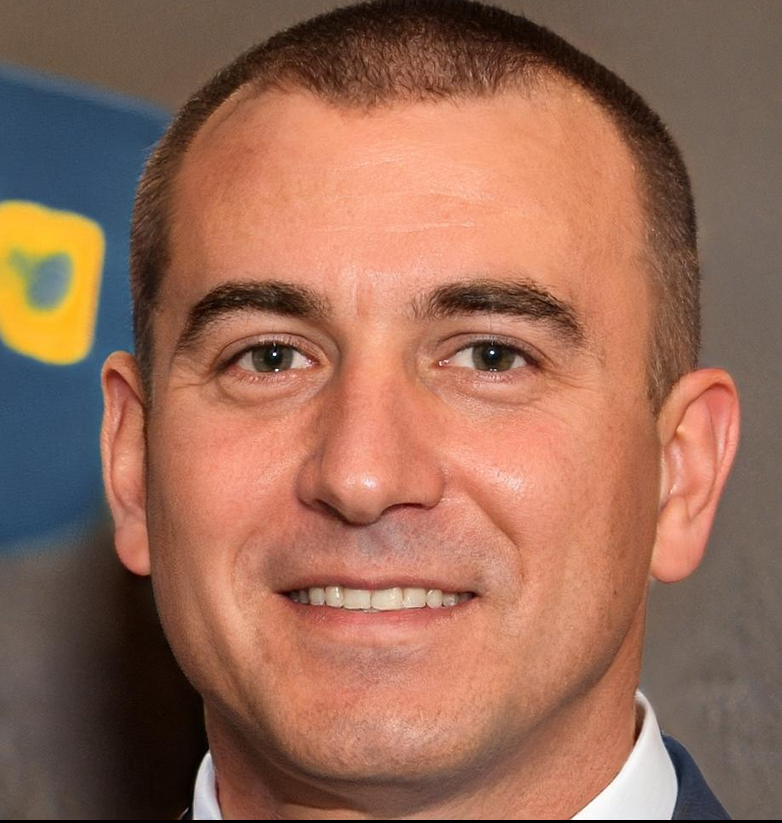
Don Schmidt
15+ years of experience in sleep therapy and Cognitive Behavioral Therapy for Insomnia (CBT-I). Passionate about connecting individuals struggling with sleep disorders to evidence-based, non-medical treatment solutions. Author of hundreds of articles and comprehensive guides on sleep health, CBT-I techniques, and overcoming insomnia. When not helping clients achieve better sleep, you can find me hiking with my family and dogs or enjoying a good book.
Ready to connect with a provider?
Allow us to connect you with a provider who can help.
